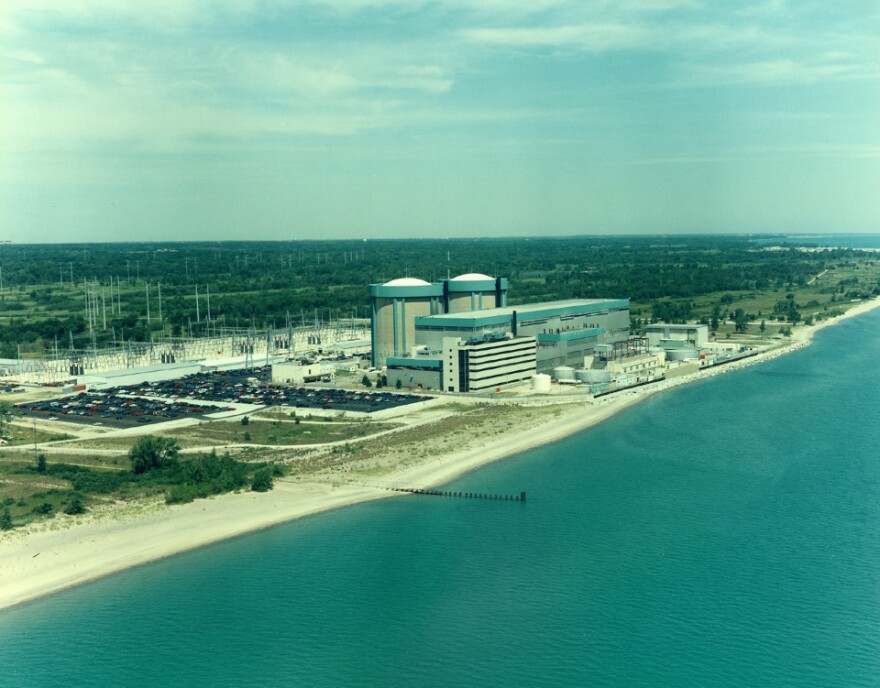Two of the roughly two dozen U.S. nuclear power plants that have shut down in recent years, or are planning to close, are on the west shore of Lake Michigan.
The former plants are not all that far from Milwaukee — near Kewaunee, Wis., and Zion, Ill. This week, a federal agency is holding meetings in those communities to discuss where the plants are in the shutdown, or decommissioning process, as well as a possible increased role for the public.
Along State Highway 42, just north of the Kewaunee County line, a large complex of power lines and white and blue buildings along Lake Michigan that made up the Kewaunee Power Station still exists. But no electricity is coming out. The plant's owner, Dominion Energy, pulled the plug six years ago, saying it no longer made economic sense to generate power there.
Even the highly radioactive fuel is still on the property. But it's been taken out of indoor pools and put in concrete and steel containers known as dry casks.
Bruce Watson, of the Nuclear Regulatory Commission (NRC), says he and an NRC inspector toured the site on Tuesday. Watson says it's in good shape.
"The plant is in safe, stable condition. Almost all the radioactive systems have been drained, so there's no tanks to leak into the groundwater. It's in a very good situation to what we call SAFSTOR. So, it's set up for the long term," Watson told WUWM.

Just how long is hard to say. Federal law allows up to 60 years after a nuclear plant shutdown to complete decommissioning. Dominion says it could be 2069 before major decommissioning and dismantlement activities get underway at Kewaunee.
At a meeting the NRC held Tuesday night in Carlton, just west of the former Kewaunee plant, local resident Steve Tadisch asked whether those the dry casks will remain in good condition.
He later explained, "It's just a safety concern. That’s all."

Dominion says there's nothing to worry about. But according to Douglas Ower, ongoing safety is yet another reason the former Kewaunee plant needs a citizen advisory board. Ower lives in Zion, Ill., just south of Kenosha, and serves on the community panel monitoring the former Zion nuclear plant that closed in 1998. Decontamination of the Zion site and taking down the buildings started in 2011 and may wrap up next year.
Ower says a citizen panel helps the public.
"One, it's a conduit to get information about what's occurring. And also, we get a closer look. In my case, on the board, we had annual tours of the plant. So, we could see more about what's going on. They can't take just every citizen into the plant. But they can take a small group in. And hopefully, were able to disseminate that information to the community," Ower said.
Bu he says there’s been a bit of an objectivity problem with the company that took over the Zion decommissioning from the local utility Exelon.

“The contractor, Zion Solutions, put together the citizens advisory panel. So, they really effectively ran the meeting and did the presentations on what they were doing. Then as a board member, we could ask questions about what they're doing. But basically, we're hearing what's coming from Zion Solutions, the contractor," Ower said.
Like at Kewaunee, the spent fuel at Zion is in dry casks. And they aren't going anywhere right now due to a lengthy fight over an intermediate or long-term national nuclear waste repository.
So, the fate of the lakefront land at Zion isn't clear.
Tuesday night's meeting in Carlton was one of 10 the NRC is holding around the U.S. The Nuclear Energy Innovation and Modernization Act requires the agency to report to Congress on best practices for community advisory boards associated with nuclear power plants. The measure was signed into law in January.

The next NRC meeting is Thursday night in Zion.
Meanwhile at Kewaunee, Dominion Energy hasn't ignored the public. After a legal fight, the company promised $500,000 per year for 10 years to partly help the tiny county of 20,000 people make up for lost utility taxes when the power station shut down.
Richard Baker, of the county’s Economic Development Corporation, says some of the funds will likely go to improving broadband or Internet service. He says that might convince companies, or at least their executives, to move in from places like Green Bay.
"So that opportunity to build some nice homes and have those executives live here, make that 30-mile commute into work. But more importantly work from home," Baker says.

He also talks of other possibilities for parts of the former Kewaunee Power Station, or the lakeshore land.
So far, Next Era Energy, which operates two generating units at the Point Beach Nuclear Plant in Manitowoc County, hasn't said anything about ceasing operations.
The NRC says another former nuclear plant, a smaller one south of La Crosse, is nearly done with decommissioning.
The nuclear industry says it wants the public to be happy with the decommissioning process because the industry hasn’t given up on adding nuclear power plants in the U.S. That’s despite concerns from citizen watchdog groups about the rising cost of nuclear energy, and the lack of a permanent solution to the problem of nuclear waste.
Support is provided by Dr. Lawrence and Mrs. Hannah Goodman for Innovation reporting.

Do you have a question about innovation in Wisconsin that you'd like WUWM's Chuck Quirmbach to explore? Submit it below.
_





